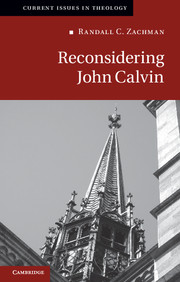Book contents
- Frontmatter
- Contents
- Abbreviations
- Introduction
- 1 The beauty and terror of the universe
- 2 The bond and critique of all social union
- 3 The one elect people of God
- 4 The restoration of Israel by gospel and law
- 5 The comfort and the challenge of love
- 6 Hoping for all others, fearing for myself
- Conclusion
- Index
Introduction
Published online by Cambridge University Press: 05 June 2012
- Frontmatter
- Contents
- Abbreviations
- Introduction
- 1 The beauty and terror of the universe
- 2 The bond and critique of all social union
- 3 The one elect people of God
- 4 The restoration of Israel by gospel and law
- 5 The comfort and the challenge of love
- 6 Hoping for all others, fearing for myself
- Conclusion
- Index
Summary
The opportunity to reconsider the theology of John Calvin was presented to me by the gracious invitation to give the Warfield Lectures at Princeton Theological Seminary in October of 2009, in honor of the five hundredth anniversary of Calvin’s birth. I am deeply grateful to Dan Migliore and Elsie McKee, who extended this invitation to me. I was encouraged to create lectures that were both historical and constructive in nature, so that I might develop themes in Calvin’s theology in light of my own contemporary theological concerns. The idea I had for the lectures was to bring the theology of Calvin into dialogue with the claim that God is love, which is slightly different than Calvin’s understanding of God as the author and fountain of every good thing. I also wanted to build on Calvin’s claim that the goal of our knowledge of God is to be ravished with wonder before the beauty, majesty, and goodness of God, for this wonder reduces us to nothing, and thus provides the best foundation for genuine and profound humility before God. Thus my goal in reconsidering John Calvin is to develop his insights into the knowledge of God and ourselves in light of the understanding that God is love, to provide a fuller understanding of the humility before God to which Calvin summons us, a humility that is ultimately produced by wonder.
I have chosen six themes in Calvin’s theology, and have brought them into conversation with other theological voices, in order to create an irresolvable dialectic at the heart of all six themes. The way this dialectic is developed differs in each chapter. In the first chapter, we explore Calvin’s passionate interest in the contemplation of the universe by astronomy, in light of his claim that “astronomy is the alphabet of theology.” Calvin thought that our contemplation of the works of God should always begin with the heavens, as this presents the clearest image of God in the universe. Such contemplation is directly related to the theme of humility, for we come to a profound sense of our own nothingness by contemplating the immensity of the heavens, and also come to a clear image of the infinity of God by the near-infinity of the heavens we behold. Calvin’s insistence that we be ravished with wonder by the beauty of the universe we behold is rendered dialectical by introducing the voice of Blaise Pascal, who knew through his use of the telescope that the universe is not only beautiful, but it is also terrifying. However, both the beauty and the terror serve to make us more humble, as we realize that we are both at home and lost in a universe of unimaginable immensity and mystery.
- Type
- Chapter
- Information
- Reconsidering John Calvin , pp. 1 - 5Publisher: Cambridge University PressPrint publication year: 2011

